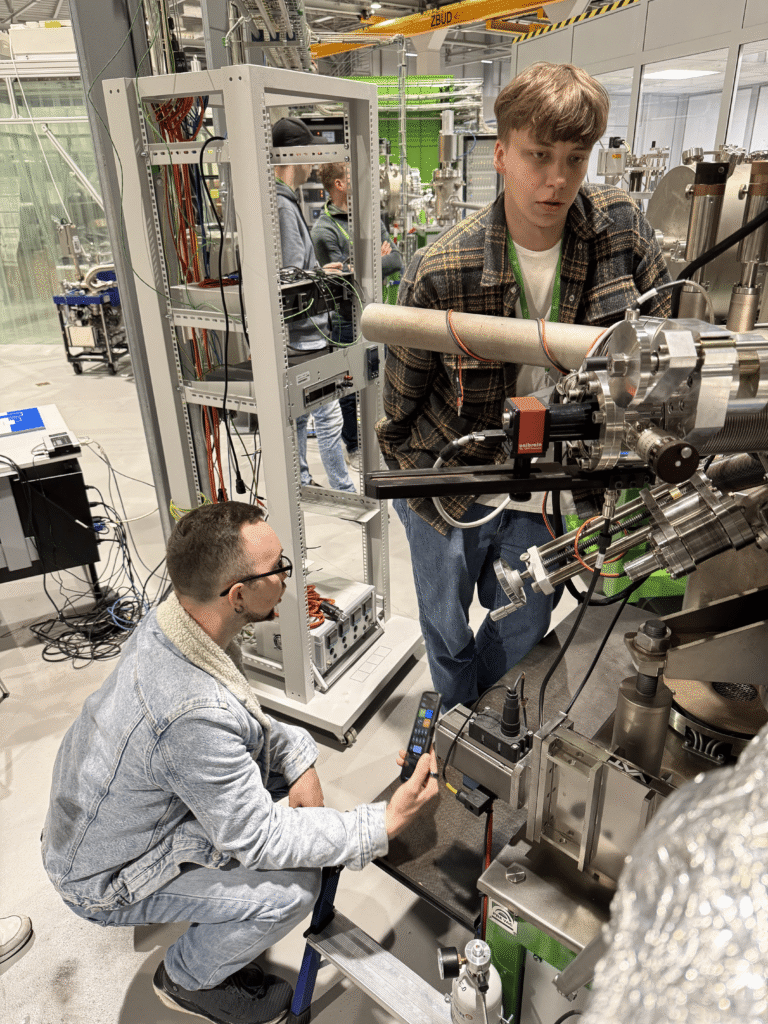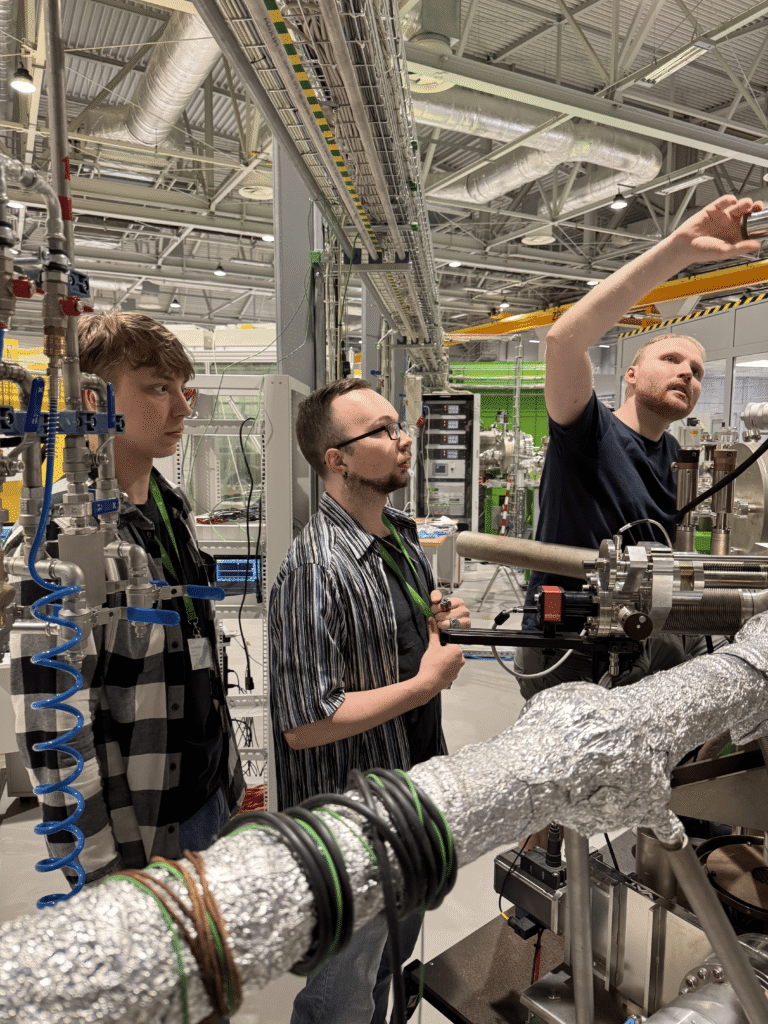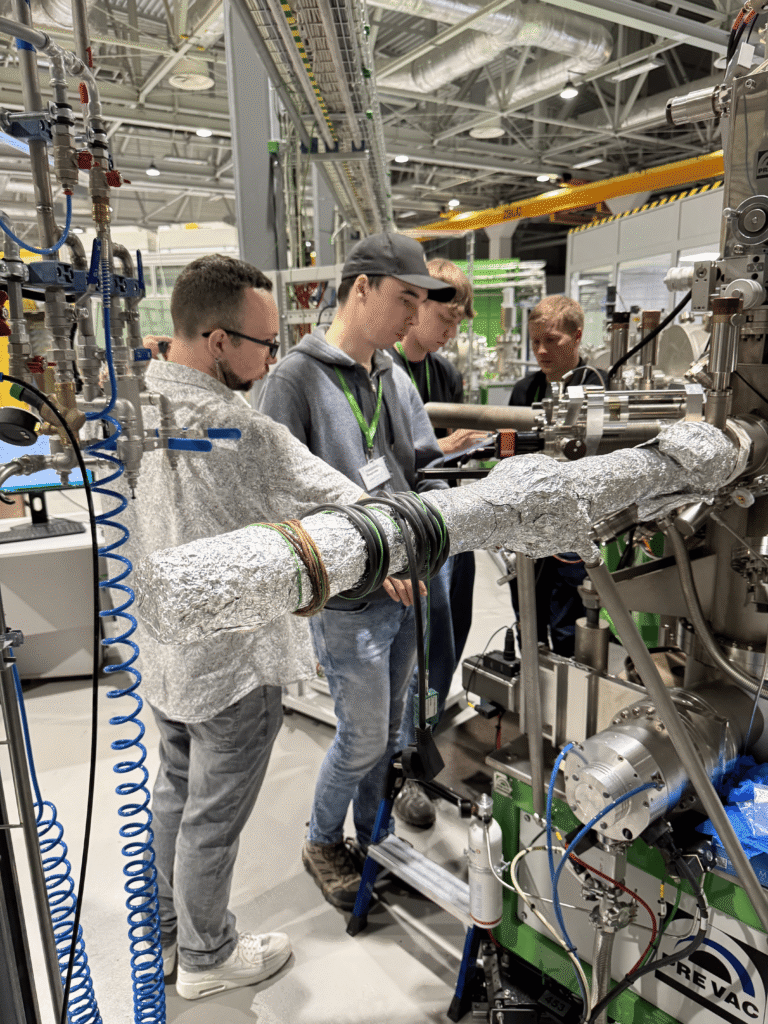In the last week of May 2025, the SOLARIS Centre hosted not only participants of the TNA programme but also two young scientists from Ukraine — Ihor Martynenko and Danylo Menesenko from Kyiv Academic University — who carried out their activities under the Twinning programme, which is one of the key components of the NEPHEWS project (Neutrons and Photons Elevating Worldwide Science).
The presence of these researchers at SOLARIS was closely linked to a TNA experiment conducted at the same time, which enabled them to directly participate in synchrotron-based research and gain hands-on experience working with large-scale research infrastructure. Their stay in Kraków is a prime example of how effectively individual skill development can be combined with knowledge transfer and scientific mentoring.
The Twinning programme under NEPHEWS aims to support researchers from Widening countries and Ukraine through direct collaboration with experienced users of research infrastructure who have previously accessed it through the TNA programme. The activities undertaken within this framework are based on a mentoring model, allowing participants to learn the methodology of advanced experiments, operate scientific equipment, and analyse data.

— “At SOLARIS, I finally had the chance to truly ‘feel’ the Fermi surface and electronic structure — not just as abstract concepts in a textbook or static images on paper, but as something real and tangible through ARPES measurements. What moved me most was the opportunity to learn directly from scientists who have mastered this technique and apply it to superconductors — the materials I am most passionate about. It was an experience no book or video could ever replicate: a transfer of living knowledge, full of subtle details and personal insights. My journey as a young researcher has taken a leap forward, filled with inspiration and fresh ideas that I can’t wait to explore. And now, I’m no longer just a Padawan — but walking steadily toward becoming a true Jedi Master.” — said Danylo Menesenko, Kyiv Academic University.
— “In my opinion, such programs provide an unforgettable experience for young scientists, in terms of scientific knowledge and research approaches in large international groups.” – added Ihor Martynenko, Kyiv Academic University.
For Ihor Martynenko and Danylo Menesenko, participation in the Twinning programme was an opportunity to engage directly with the research team conducting an experiment at the URANOS beamline. During their stay at SOLARIS, they were able to observe advanced synchrotron measurements up close, gaining valuable experience in how large-scale research infrastructure operates. At the same time, they established relationships with the technical team and researchers from other countries, creating a space for knowledge exchange and mutual learning in an international setting.
— “Collaboration within the research team has allowed me to understand how science operates in international laboratories – both in terms of work organization and the availability and diversity of equipment, for example, for sample preparation in designated facilities. This was my first experience working in such a large scientific group, where I could benefit from the expertise and support of highly qualified theorists and practitioners, covering the full range of topics relevant to my interests.” – said Ihor Martynenko, Kyiv Academic University.
The competence support offered through the Twinning programme is essential for strengthening the research potential of home institutions and for the long-term development of young scientists in supported countries. The programme is an important part of the strategy for equalizing access to modern research tools and international collaboration. It enables young researchers from countries with limited access to large-scale infrastructure not only to gain practical knowledge, but also to enter the global scientific community — as partners rather than observers.

— “The hands-on ARPES experience at SOLARIS reshaped the way I think about electronic structure — not as a line on a graph, but as a physical reality hidden within every material I study. This shift in perspective will fundamentally influence how I approach the synthesis and analysis of superconducting thin films. I now see each sample not just as a measurement target, but as a gateway to deeper questions about symmetry, correlations, and the quantum nature of matter. Armed with this experience — like my own Curiosity rover — I feel ready to explore the intricate and fascinating terrain of the Fermi surface with greater precision, imagination, and a spirit of scientific adventure. I gained practical insight into how synchrotron-based ARPES complements lab-based techniques, and I plan to integrate this knowledge when investigating superconducting materials and their emergent quantum properties.” – added Danylo Menesenko, Kyiv Academic University.
The presence of Ihor Martynenko and Danylo Menesenko at the SOLARIS Centre is not only an example of effective implementation of the NEPHEWS project objectives but also a sign of genuine commitment to developing future scientific leaders in regions of strategic importance for Europe. As a tool supporting mobility and knowledge transfer, the Twinning programme creates conditions for young researchers to gain experience that would be difficult to achieve in their local contexts, particularly in countries affected by crisis or institutional limitations. Through direct contact with research equipment, experimental procedures, and highly specialized scientific teams, programme participants can not only expand their competences but also realistically prepare for conducting independent research at the international level.

It is worth emphasizing that collaboration under the Twinning programme does not end with a single laboratory visit — its true value is revealed in the longer term: in future joint projects, publications, the transfer of best practices, and educational initiatives. Building this kind of lasting scientific relationship is crucial for shaping a cohesive European research area based on partnership, balanced skill development, and mutual institutional strengthening. The example of collaboration with young researchers from Ukraine shows that investment in twinning is not only an educational measure but also a key element in building the resilience and regenerative capacity of entire scientific systems in regions receiving targeted support.
Author: Agnieszka Cudek